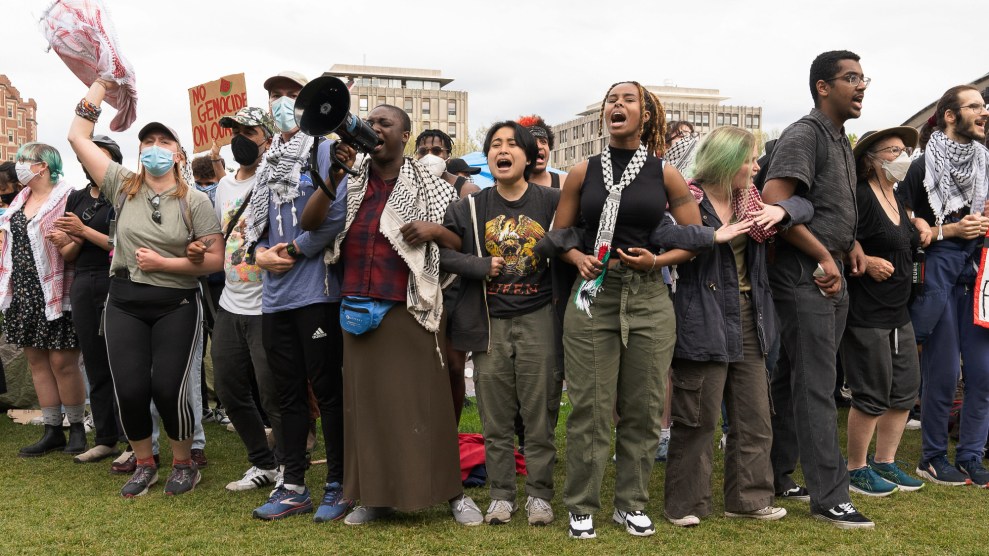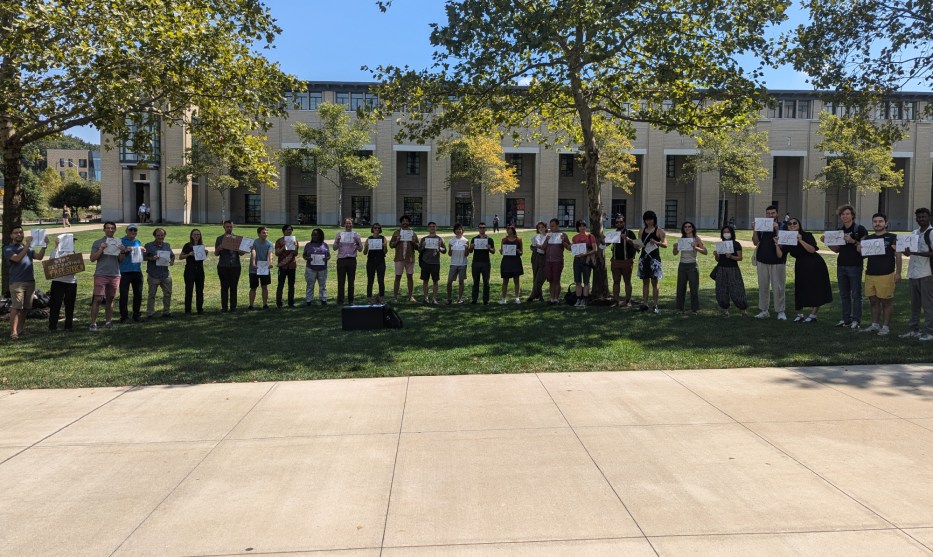
Thousands of US students demonstrated in support of Palestinians over the past year. Now, those who are here on visas may be under threat. Vincent Ricci/SOPA Images via ZUMA Press Wire
On Monday, President Donald Trump signed an executive order aiming to restrict immigration, titled “Protecting the United States From Foreign Terrorists and Other National Security and Public Safety Threats.” It has been described as a revival of his first-term Muslim “travel ban,” making good on a campaign promise to bring back the controversial rule.
Buried in the executive order is the fulfillment of another vow from the campaign: an attempt to find a way to easily deport pro-Palestine demonstrators.
While much of the new order mimics the old Muslim “travel ban” Trump signed on the first day of his first term in 2017, this order is more neutral on its face. This time, Trump is not explicitly naming specific countries to target, but asking agencies to submit a report within 60 days outlining countries from which to suspend immigration.
“Students are afraid of being labeled as terrorists, and now there’s more ammunition from this executive order to actually carry that out.”
And then, tucked at the bottom, is a new provision that appears to explicitly single out new immigrants on ideological grounds—in particular, those on student visas who participate in protests against Israel’s war on Gaza.
It tells the secretary of state, attorney general, secretary of homeland security, and director of national intelligence to:
Recommend any actions necessary to protect the American people from the actions of foreign nationals who have undermined or seek to undermine the fundamental constitutional rights of the American people, including, but not limited to, our Citizens’ rights to freedom of speech and the free exercise of religion protected by the First Amendment, who preach or call for sectarian violence, the overthrow or replacement of the culture on which our constitutional Republic stands, or who provide aid, advocacy, or support for foreign terrorists.
Student protesters against the bombing of Gaza do not generally describe themselves as preaching sectarian violence or undermining the constitutional rights of the American people. But conservative organizations like the Heritage Foundation certainly have. Last summer, the foundation claimed the pro-Palestine student encampments were Iran- and Russia-funded front operations motivated by “anti-American animus.” In fact, throughout the presidential election, Republicans over and over branded antiwar protesters as supporters of terrorism.
“They learned from their ‘mistakes’ the last time around,” legal scholar and University of Colorado associate professor Maryam Jamshidi told me of the new executive order.
While the scope of the order is vague, Jamshidi said this language “seems clearly targeted to foreign nationals involved in pro-Palestine protests, in particular foreign students on visas.”
Republicans have been threatening to deport these students for months.
Secretary of State Marco Rubio pressed to deport “pro-Hamas” students as early as October 19, 2023—back when he was a US senator representing Florida and less than two weeks after the Hamas attack on Israel. In Rubio’s confirmation hearing for secretary of state last week, he said the US would “revoke the visas” of anyone determined to be a “supporter of Hamas.”
“We know—based on statements that have been made by Trump and others—that new provisions will be used to target pro-Palestine protesters,” Jamshidi said.
In an October 2023 letter no longer available on Rubio’s Senate website, he calls on the Department of State to immediately work toward “identifying and deporting jihadist supporters.” Multiple pieces of legislation proposed the same idea last year. And since Trump’s election, members of the GOP have continued their calls for deportation as retribution against student protesters. (Notably, a leader of the extremist Zionist group Betar was quoted in the New York Post as using “facial recognition software” to create deportation lists on Trump’s behalf.)
An ad hoc coalition of legal advocates has spent the past year and a half answering questions from worried students who fear they might be next on the list. Trump and his team have “made it pretty explicit that their white supremacist, Christian nationalist agenda is motivating a lot of their decisions,” said Lamya Agarwala, an attorney with the Council on American-Islamic Relations.
Agarwala has been hearing from noncitizen student activists and, she said, from Palestinian students who aren’t activists at all, but fear their nationality alone will be enough to place them under suspicion.
“We see that this executive order claims to be about national security and public safety,” Agarwala said. But in practice, she sees it as “categorically attributing this idea of dangerousness to people who aren’t US citizens, to people who aren’t white, to people who don’t come from Christian-majority countries, and then using that as a basis to target them for exclusion from the United States—and for those who are already in the United States, attempting to remove them from the interior.”
During Trump’s first term, internal US Immigration and Customs Enforcement documents revealed that his team, at one point, considered implementing ideological purity tests—before eventually deciding not to pursue the move because it was unconstitutional. Under US law, noncitizens have the right to free speech. “Once you’re in the United States, whatever your status is, the US Constitution then becomes a basis to protect you,” Jamshidi said.
Nonetheless, the exclusion of noncitizens based on perceived ideology or speech acts goes much further back than Trump: The McCarran Internal Security Act, passed in 1950, excluded anyone defined as a communist, totalitarian, or fascist from the United States.
It’s a classic American “fearmongering tactic,” said Sadaf Hasan, a staff attorney at Muslim Advocates, a civil rights group formed in response to the passage of the Patriot Act. “Students are afraid of being labeled as terrorists, and now there’s more ammunition from this executive order to actually carry that out.”

















